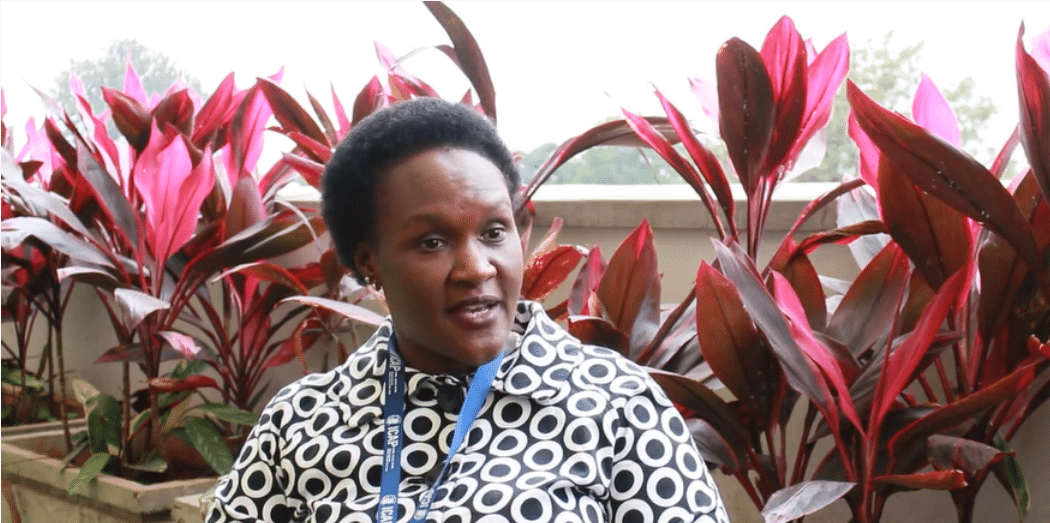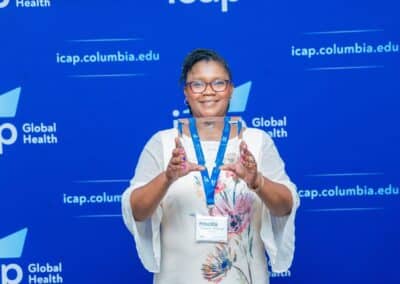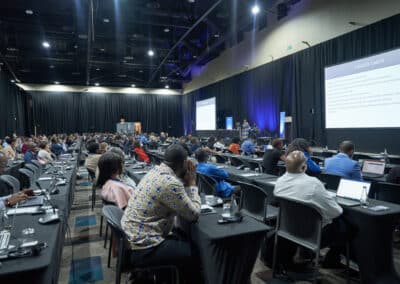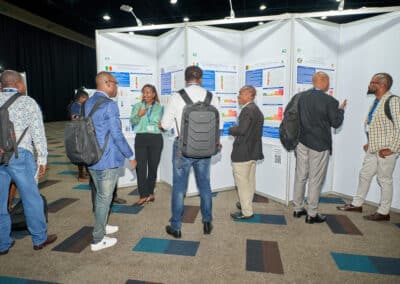Dr. Cordelia Katureebe is a medical doctor and the national coordinator for HIV care and treatment at the Ministry of Health (MOH) of Uganda. She oversees the development, implementation, and measurement of differentiated service delivery (DSD) throughout Uganda. In June 2019, Dr. Katureebe and 165 of her colleagues from 11 countries attended CQUIN’s Meeting on DSD Quality and Quality Improvement in Nairobi, Kenya to discuss quality standards for DSD programs, measurement of DSD program performance, and the use of quality improvement methods to enhance DSD initiatives.
Interviewed at the Nairobi meeting, Dr. Katureebe discussed successes and challenges in scaling up DSD in Uganda, the advantages of being a member of the CQUIN Learning Network, and the need for improved QI for DSD in Uganda and beyond.
Why is DSD so important in the context of Uganda?
In Uganda, we have one of the largest and oldest HIV epidemics. Our programming started in 2004, and since then the conversation has evolved, knowledge around HIV has grown, and we have improved service delivery steadily throughout the years.
As we move toward achieving the fast track targets and epidemic control by 2020, we know we must focus on efficiencies. This means taking well-known interventions to scale as well as improving the quality of our programming—focusing on how we promote adherence to medication, provide psychosocial support, retain people in care and more.
DSD is so valuable because it considers the needs of the facility and the preferences of the client. DSD implementation addresses both quality and efficiency, which is why this meeting on QI is so important.
In the context of Uganda, what do you see as a challenge to DSD scale-up?
I see two primary challenges to DSD scale-up in Uganda.
The first is quality. To provide quality, you have got to love something.
This means being engaged and engaging others. We have so many stakeholders—from policymakers at the government level, to implementers at the subnational level, to health care providers at the direct service level, to recipients of care at the community level—and getting them all at the same table to share experiences and work toward a common objective can be a challenge. In Uganda we have already developed a platform to discuss QI, and DSD is part of that process, however, more can be done to connect this matrix of individuals and strengthen collaboration.
The second challenge is resources. To implement QI, resources such as time, space, and team members are essential. Though QI has been a topic of discussion, it has not been implemented to a high degree at the district level due to lack of resources. These must be improved for impact, continuous engagement, and DSD scale-up. These are some of the systemic challenges that we see.
Is there a success in Uganda’s DSD implementation that you would like to highlight?
In Uganda, the national commitment has been excellent. When we look at our CQUIN dashboard, we see that our DSD coverage is at 75% right now, and that is due in part to the strong level of commitment at the subnational level. Additionally, there are minimal DSD knowledge gaps—monitoring and supervision is solid, with members readily equipped with the skills and knowledge to enhance DSD implementation.
One of the most heartening and positive aspects of DSD scale-up in Uganda is the engagement of recipients of care beyond the community-level. They are involved in facility-level activities and discussions, including the development of toolkits. We have conducted assessments on DSD knowledge among recipients of care and are continually motivated by their feedback. They say, “we are happy about these community models, let’s enhance scale-up.”
DSD and CQUIN have been positives for Uganda, and, for me, the evidence is in the feedback we receive from recipients of care. This QI meeting will serve to strengthen our program further, so that we may deliver care more efficiently and effectively.
What has been the best part about being a member country of CQUIN?
The learning.
Just this morning, I was listening to the keynote presentation and telling my colleagues that QI is an aspect we should continue to focus on. Hearing the progress and challenges in other countries provides a unique opportunity for growth, South-to-South learning, and increases the capacity of the whole network.
Additionally, the CQUIN Dashboard has been instrumental for measurement of DSD scale-up in Uganda. When we first started this process, we were unsure how to measure our progress, so CQUIN came in at the right time. With the dashboard we have a standardized form of measurement to track our progress in continuum with other member countries. Being a part of this hub of learning has been instrumental in allowing us to enhance and improve the way we deliver care.
The CQUIN Learning Network looks forward to welcoming Dr. Cordelia Katureebe and her colleagues to the 3rd CQUIN Annual Meeting in Johannesburg, South Africa next month (November 2019).
Learn More about DSD Scale-Up in Uganda
Learn More about ICAP’s Broader Portfolio of Work in Uganda






